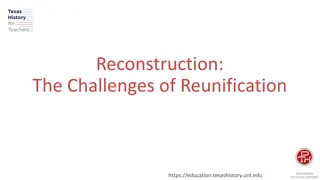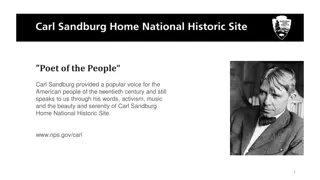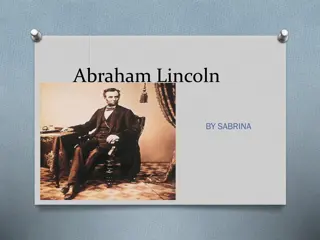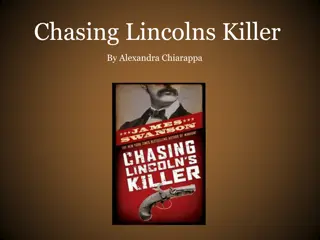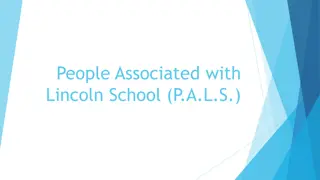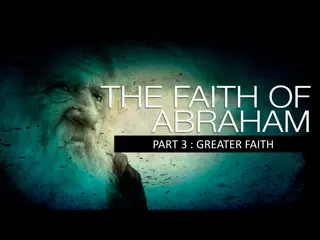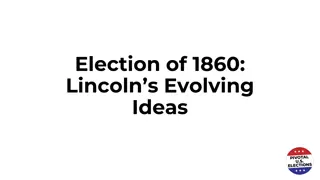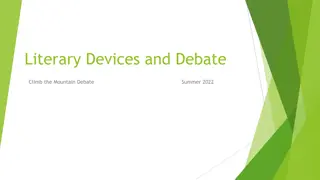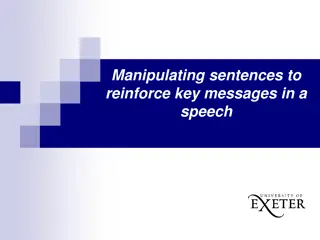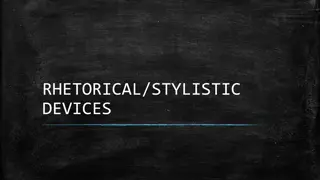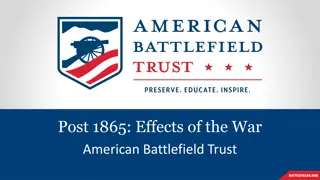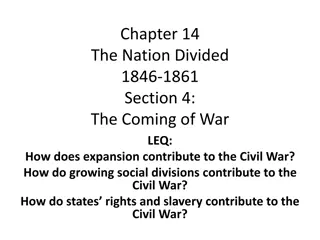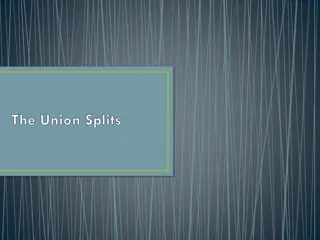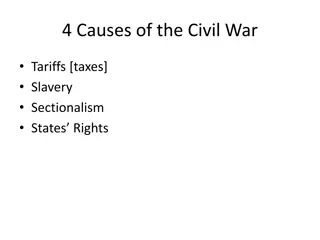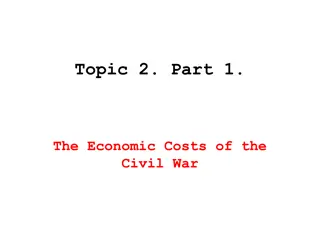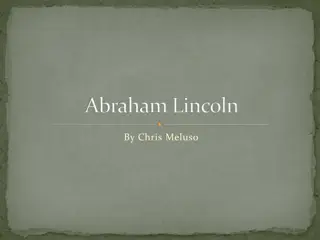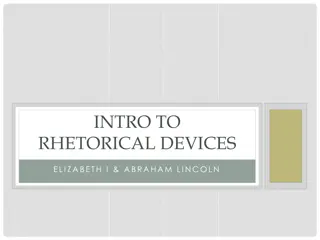Abraham Lincoln's Impact on Sectionalism and Civil War Through His Speeches
Explore Abraham Lincoln's famous speeches to shed light on the era of sectionalism and Civil War. Discover Lincoln's purpose and craft as an author by examining his best-known speeches, revealing his stance on slavery and efforts to preserve the union during a tumultuous period in American history.
Download Presentation

Please find below an Image/Link to download the presentation.
The content on the website is provided AS IS for your information and personal use only. It may not be sold, licensed, or shared on other websites without obtaining consent from the author. Download presentation by click this link. If you encounter any issues during the download, it is possible that the publisher has removed the file from their server.
E N D
Presentation Transcript
ABRAHAM LINCOLN Teaching the Speeches
QUESTIONS How do Lincoln s three most famous speeches shed light on the period of sectionalism and Civil War? What can we learn about Lincoln s purpose and craft as an author from examining his best-known speeches?
PART 1. Context: Sectionalism and Civil War
IMPORTANT DATES February 12, 1809 Born in Larue County, Kentucky 1834 Elected to Illinois State House of Representatives 1847-49 U.S. House of Representatives 1860 Elected president March 4, 1861 First Inaugural November 19, 1863 Gettysburg Address March 4, 1865 Second Inaugural April 9, 1865 End of the Civil War Assassinated at Ford s Theatre, Washington DC April 15, 1865
IMPORTANT DATES February 12, 1809 Born in Larue County, Kentucky 1834 Elected to Illinois State House of Representatives 1847-49 U.S. House of Representatives 1860 Elected president March 4, 1861 First Inaugural November 19, 1863 Gettysburg Address March 4, 1865 Second Inaugural April 9, 1865 End of the Civil War Assassinated at Ford s Theatre, Washington DC April 15, 1865
SLAVERYTHE ROOT OF SECTIONALISM Enslaved people in the antebellum South made up one third of the population. The abolitionist movement flourished between 1830-1860, fueled in large part by slave narratives. 1852 publication of Uncle Tom s Cabin.
SLAVERYLINCOLNS POSITION Lincoln consistently declared he was opposed to slavery, but he did not call for emancipation, because 1) while he believed slavery was morally wrong, 2) he also respected the Constitution, which sanctioned the practice.
SECTIONALISM AND CIVIL WAR (THE 1850S) Compromise of 1850 A series of bills passed by congress in 1850 were aimed at settling the issue of slavery and preserving the union. Kansas-Nebraska Act of 1854 Repealed Missouri Compromise, created two new territories and allowed for popular sovereignty to decide whether slavery would be permitted. Formation of Republican Party to combat the expansion of slavery into American territories., Bleeding Kansas, 1854-1859 Violent civil confrontations in Kansas and western Missouri.
JOHN BROWNS RAID ON HARPER S FERRY, OCT. 16-18, 1859
LINCOLN ELECTED ON NOV. 6, 1860 Lincoln won the Electoral College with less than 40 percent of the popular vote nationwide by carrying states above the Mason Dixon line and north of the Ohio River, plus the states of California and Oregon in the Far West. Unlike every preceding president-elect, Lincoln did not carry even one slave state.
SECESSION OF THE SOUTH South Carolina (December 20, 1860) Mississippi (January 9, 1861) Florida (January 10, 1861) Alabama (January 11, 1861) Georgia (January 19, 1861) Louisiana (January 26, 1861) Texas (February 1, 1861) Virginia (April 17, 1861) Arkansas (May 6, 1861) North Carolina (May 20, 1861) Tennessee (June 8, 1861)
SECESSION OF THE SOUTH South Carolina (December 20, 1860) Mississippi (January 9, 1861) Florida (January 10, 1861) Alabama (January 11, 1861) Georgia (January 19, 1861) Louisiana (January 26, 1861) Texas (February 1, 1861) Virginia (April 17, 1861) Arkansas (May 6, 1861) North Carolina (May 20, 1861) Tennessee (June 8, 1861)
AND THE WAR CAME. The Civil War was the deadliest war in American history. Estimates range from between 625,000 to 750,000 dead. (At least 210,000 soldiers were killed in action.) Emancipation Proclamation signed on January 1, 1863. The bloodiest battle of the war took place at Gettysburg in July 1863.
PART 2. Teaching the addresses.
FIRST INAUGURAL MARCH 4, 1861 January 1861: After Lincoln s election, South Carolina secedes, followed by six more states. February 1861: The southern states form a separate government. They soon seize Federal forts in the South. March 1861: Lincoln is faced with the daunting task of addressing the fractured nation.
FIRST INAUGURAL MARCH 4, 1861 4, 1861MARCH 4, 186 MAR MARCH 4, 186C 1) To persuade a fractured nation not to fracture any more. 2) To present himself as an agent of stability, not change. 3) To gently assert the illegality of secession. Lincoln s daunting task:
. . . Apprehension seems to exist among the people of the Southern States that by the accession of a Republican Administration their property and their peace and personal security are to be endangered. . . . I do but quote from one of those speeches when I declare that I have no purpose, directly or indirectly, to interfere with the institution of slavery in the States where it exists. I believe I have no lawful right to do so, and I have no inclination to do so. HIGHLIGHTS FROM THE FIRST INAUGURAL . . . I hold that in contemplation of universal law and of the Constitution the Union of these States is perpetual. . . . If the United States be not a government proper, but an association of States in the nature of contract merely, can it, as a contract, be peaceably unmade by less than all the parties who made it? One party to a contract may violate it break it, so to speak but does it not require all to lawfully rescind it?
HIGHLIGHTS FROM THE FIRST INAUGURAL One section of our country believes slavery is right and ought to be extended, while the other believes it is wrong and ought not to be extended. This is the only substantial dispute. The fugitive-slave clause of the Constitution and the law for the suppression of the foreign slave trade are each as well enforced, perhaps, as any law can ever be in a community where the moral sense of the people imperfectly supports the law itself. This, I think, can not be perfectly cured, and it would be worse in both cases after the separation of the sections than before. In your hands, my dissatisfied fellow-countrymen, and not in mine, is the momentous issue of civil war. The Government will not assail you. You can have no conflict without being yourselves the aggressors. You have no oath registered in heaven to destroy the Government, while I shall have the most solemn one to preserve, protect, and defend it.
I am loth to close. We are not enemies, but friends. We must not be enemies. Though passion may have strained it must not break our bonds of affection. The mystic chords of memory, stretching from every battlefield and patriot grave to every living heart and hearthstone all over this broad land, will yet swell the chorus of the Union, when again touched, as surely they will be, by the better angels of our nature. FIRST INAUGURAL THE CONCLUSION MARCH 4, 1861
LINCOLNS REVISIONS William Seward: I close. We are not, we must not be, aliens or enemies, but fellow- countrymen and brethren. Although passion has strained our bonds of affection too hardly, they must not, I am sure they will not, be broken. The mystic chords which, proceeding from so many battlefields and so many patriot graves pass through all the hearts and all the hearths of this broad continent of ours, will yet harmonize in their ancient music when breathed upon by the guardian angels of the nation. Lincoln: I am loth to close. We are not enemies, but friends. We must not be enemies. Though passion may have strained it must not break our bonds of affection. The mystic chords of memory, stretching from every battlefield and patriot grave to every living heart and hearthstone all over this broad land, will yet swell the chorus of the Union, when again touched, as surely they will be, by the better angels of our nature.
GETTYSBURG ADDRESS NOVEMBER 19, 1863 July 1-3, 1863 Estimated casualties: 51,112 Union: 23,049 Confederate: 28,063 The battle involved the single largest number of casualties in any U.S. war and is widely considered the turning point of the Civil War. Lincoln s address is 272 words.
GETTYSBURG ADDRESS NOVEMBER 19, 1863 Four score and seven years ago our fathers brought forth on this continent, a new nation, conceived in Liberty, and dedicated to the proposition that all men are created equal. Now we are engaged in a great civil war, testing whether that nation, or any nation so conceived and so dedicated, can long endure. We are met on a great battle-field of that war. We have come to dedicate a portion of that field, as a final resting place for those who here gave their lives that that nation might live. It is altogether fitting and proper that we should do this. But, in a larger sense, we can not dedicate -- we can not consecrate -- we can not hallow -- this ground. The brave men, living and dead, who struggled here, have consecrated it, far above our poor power to add or detract. The world will little note, nor long remember what we say here, but it can never forget what they did here. It is for us the living, rather, to be dedicated here to the unfinished work which they who fought here have thus far so nobly advanced. It is rather for us to be here dedicated to the great task remaining before us -- that from these honored dead we take increased devotion to that cause for which they gave the last full measure of devotion -- that we here highly resolve that these dead shall not have died in vain - - that this nation, under God, shall have a new birth of freedom -- and that government of the people, by the people, for the people, shall not perish from the earth.
GETTYSBURG ADDRESS: A REVOLUTION IN THOUGHT NOVEMBER 19, 1863 Four score and seven years ago our fathers brought forth on this continent, a new nation, conceived in Liberty, and dedicated to the proposition that all men are created equal. Declaration of Independence: We hold these truths to be self-evident, that all men are created equal, that they are endowed by their Creator with certain unalienable Rights, that among these are Life, Liberty and the pursuit of Happiness.
GETTYSBURG ADDRESS: A REVOLUTION IN STYLE NOVEMBER 19, 1863 Four score and seven years ago our fathers brought forth on this continent, a new nation, conceived in Liberty, and dedicated to the proposition that all men are created equal. Now we are engaged in A GREAT CIVIL WAR, testing whether that nation, or any nation so conceived and so dedicated, can long endure. We are met on a great <battle-field> of THAT WAR. We have come to dedicate a portion of <that field>, as a final resting place for those who here gave their lives that that nation might live. It is altogether fitting and proper that we should do this. But, in a larger sense, we can not dedicate -- we can not consecrate -- we can not hallow -- this ground. The brave men, living and dead, who struggled here, have consecrated it, far above our poor power to add or detract. The world will little note, nor long remember what we say here, but it can never forget what they did here. It is for us the living, rather, to be dedicated here to the unfinished work which they who fought here have thus far so nobly advanced. It is rather for us to be here dedicated to the great task remaining before us -- that from THESE HONORED DEAD we take increased devotion to that cause for which they gave the last full measure of devotion -- that we here highly resolve that THESE DEAD shall not have died in vain -- that this nation, under God, shall have a new birth of freedom -- and that government of the people, by the people, for the people, shall not perish from the earth.
GETTYSBURG ADDRESS: A REVOLUTION IN STYLE NOVEMBER 19, 1863 Garry Wills, Lincoln at Gettysburg: Despite the suggestive images of birth, testing, and rebirth, the speech is surprisingly bare of ornament. The language is itself made strenuous, its musculature easily traced, so even the grammar becomes a form of rhetoric. By repeating the antecedent as often as possible, instead of referring to it indirectly by pronouns like it or they, or by backward referential words like former and latter, Lincoln interlocks his sentences, making of them a constantly self-referential system. This linking up by explicit repetition amounts to a kind of hook-and-eye method for joining the parts of his address (172).
SECOND INAUGURAL: WITH MALICE TOWARD NONE MARCH 4, 1865 The Civil War will end in one month. Louis Menand: It is a remarkable fact about the United States that it fought a civil war without undergoing a change in its form of government. . . The war was fought to preserve the system of government that had been established at the nation s founding to prove, in fact, that the system was worth preserving, that the idea of democracy had not failed. This is the meaning of the Gettysburg Address. . . . Preface, The Metaphysical Club: A Story of Ideas in America
SECOND INAUGURAL MARCH 4, 1865 On the occasion corresponding to this four years ago all thoughts were anxiously directed to an impending civil war. All dreaded it, all sought to avert it. While the inaugural address was being delivered from this place, devoted altogether to saving the Union without war, insurgent agents were in the city seeking to destroy it without war seeking to dissolve the Union and divide effects by negotiation. Both parties deprecated war, but one of them would make war rather than let the nation survive, and the other would accept war rather than let it perish. And the war came. In his first paragraph, Lincoln attempts to direct the focus away from I and toward the we of a reunified nation. He is careful to avoid explicit blame, instead using vague language when describing motivations.
SECOND INAUGURAL MARCH 4, 1865 One-eighth of the whole population were colored slaves, not distributed generally over the Union, but localized in the southern part of it. These slaves constituted a peculiar and powerful interest. All knew that this interest was somehow the cause of the war. To strengthen, perpetuate, and extend this interest was the object for which the insurgents would rend the Union even by war, while the Government claimed no right to do more than to restrict the territorial enlargement of it. Neither party expected for the war the magnitude or the duration which it has already attained. . . . Here Lincoln says that slavery was the cause of the war a stark change from the First Inaugural.
SECOND INAUGURAL MARCH 4, 1865 Both read the same Bible and pray to the same God, and each invokes His aid against the other. It may seem strange that any men should dare to ask a just God's assistance in wringing their bread from the sweat of other men's faces, but let us judge not, that we be not judged. The prayers of both could not be answered. That of neither has been answered fully. The Almighty has His own purposes. Lincoln provides quotes from the Bible at least 4 times and mentions God 14 times. He summons prayer repeatedly. His reading of the war has shifted from a political one to a theological one. Because slavery is a sin, the nation must be punished.
SECOND INAUGURAL MARCH 4, 1865 If we shall suppose that American slavery is one of those offenses which, in the providence of God, must needs come, but which, having continued through His appointed time, He now wills to remove, and that He gives to both North and South this terrible war as the woe due to those by whom the offense came, shall we discern therein any departure from those divine attributes which the believers in a living God always ascribe to Him? Fondly do we hope, fervently do we pray, that this mighty scourge of war may speedily pass away. Yet, if God wills that it continue until all the wealth piled by the bondsman's two hundred and fifty years of unrequited toil shall be sunk, and until every drop of blood drawn with the lash shall be paid by another drawn with the sword, as was said three thousand years ago, so still it must be said "the judgments of the Lord are true and righteous altogether. Lincoln is no longer a lawyer arguing from premises, but a prophet. At the same time, he is using Biblical language to secure a political point: he argues that Congress needs to craft a constitutional amendment that will outlaw slavery.
SECOND INAUGURAL MARCH 4, 1865 With malice toward none, with charity for all, with firmness in the right as God gives us to see the right, let us strive on to finish the work we are in, to bind up the nation's wounds, to care for him who shall have borne the battle and for his widow and his orphan, to do all which may achieve and cherish a just and lasting peace among ourselves and with all nations. A return to inclusive language, to phrases of healing and reconciliation, to replace images of enslavement with those of tender care and charity.
With malice toward none; with charity for all; with firmness in the right, as God gives us to see the right, let us strive on to finish the work we are in; to bind up the nation's wounds; to care for him who shall have borne the battle, and for his widow and his orphan to do all which may achieve and cherish a just, and a lasting, peace among ourselves, and with all nations. SECOND INAUGURAL: A REDEMPTION POEM MARCH 4, 1865
THE LEGACY OF LINCOLN S SPEECHES Guided the nation through the Civil War. Combined poetic sentences with plain language. Was able to communicate with the masses. Reinterpreted the American experiment through the lens of the Declaration. Sought to reunify the nation.
First Inaugural Address: https://avalon.law.yale.edu/19th_century/lincoln1 .asp Gettysburg Address: https://www.abrahamlincolnonline.org/lincoln/sp eeches/gettysburg.htm RESOURCES Second Inaugural Address: https://www.nps.gov/linc/learn/historyculture/lin coln-second-inaugural.htm Garry Wills, Lincoln at Gettysburg: The Words that Remade America (NY: Simon & Schuster, 1992)


![❤[PDF]⚡ Civil War Talks: Further Reminiscences of George S. Bernard and His Fel](/thumb/20551/pdf-civil-war-talks-further-reminiscences-of-george-s-bernard-and-his-fel.jpg)
